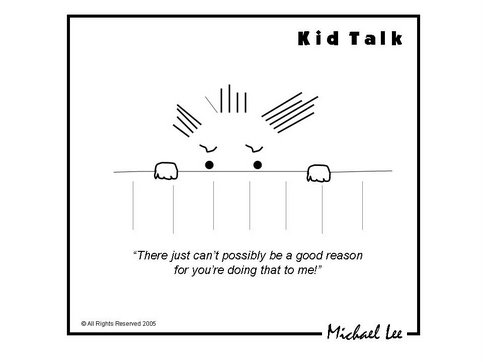

Friday, 20 July 2007
2007 07: Unhappiness at home leads to bad behaviour
The Star Online. Opinion. Sunday July 15, 2007
CHILDREN behave badly or go missing for many reasons, but unhappiness at home, real or imagined, is a common factor. Since 2004 up to May this year, 1,900 children had been reported missing, most of them girls, disclosed Deputy Internal Security Minister Datuk Mohd Johari Baharum.
Parents blame the teachers, who in turn bristle at the injustice of parents dumping the entire weight of responsibility on them. Ideally parents and teachers should work in tandem. But the reality is that a teacher faces 50 hyperactive children each day, a clutch of whom are actively disruptive to lessons.
On and off the school grounds, teenage temptations beckon like tall-grass at their feet — smoking, sex, drugs, easy money and junior-league gangsterism.
Some do trip and fall, and those who commit and are convicted of lesser offences would be placed in designated approved schools.
For more serious crimes, boys aged between 14 and 21 would be sent to the Henry Gurney reform schools, which gives them a second chance, a skill and often, sadly, a stigma.
The assumption that adults know best now no longer holds true. Today's young people show far more knowledge than their years, although “In terms of dependence on their parents, however, compared to developed countries, we are three to four years behind,” said Dr Mohamed Fadzil.
Nevertheless, they would like to be consulted on their preferences as punishment: conventional youth correctional facilities, innovative community service as well as the much-maligned caning. Plus any other out-of-the-box solutions for “bad behaviour”.
In the end, laws must reflect the values of the environment of the day, said Dr Mohamed Fadzil. Otherwise the laws would become straightjackets, caging the youths in adult expectations.
CHILDREN behave badly or go missing for many reasons, but unhappiness at home, real or imagined, is a common factor. Since 2004 up to May this year, 1,900 children had been reported missing, most of them girls, disclosed Deputy Internal Security Minister Datuk Mohd Johari Baharum.
Parents blame the teachers, who in turn bristle at the injustice of parents dumping the entire weight of responsibility on them. Ideally parents and teachers should work in tandem. But the reality is that a teacher faces 50 hyperactive children each day, a clutch of whom are actively disruptive to lessons.
On and off the school grounds, teenage temptations beckon like tall-grass at their feet — smoking, sex, drugs, easy money and junior-league gangsterism.
Some do trip and fall, and those who commit and are convicted of lesser offences would be placed in designated approved schools.
For more serious crimes, boys aged between 14 and 21 would be sent to the Henry Gurney reform schools, which gives them a second chance, a skill and often, sadly, a stigma.
The assumption that adults know best now no longer holds true. Today's young people show far more knowledge than their years, although “In terms of dependence on their parents, however, compared to developed countries, we are three to four years behind,” said Dr Mohamed Fadzil.
Nevertheless, they would like to be consulted on their preferences as punishment: conventional youth correctional facilities, innovative community service as well as the much-maligned caning. Plus any other out-of-the-box solutions for “bad behaviour”.
In the end, laws must reflect the values of the environment of the day, said Dr Mohamed Fadzil. Otherwise the laws would become straightjackets, caging the youths in adult expectations.
Subscribe to:
Post Comments (Atom)



No comments:
Post a Comment